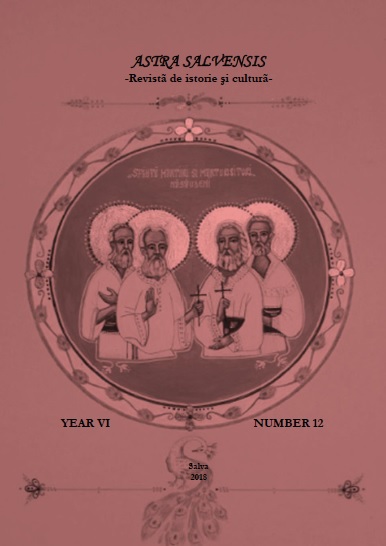L’esperienza Della ,,Frontiera Culturale” (1916-1918) Descritta Nelle Memorie del Prete Sebastian Stanca
The experience of "cultural board" depicted in the memorials of the priest Sebastian Stanca
Author(s): Mihai-Octavian Groza , Diana-Maria Dăian Subject(s): History, Social Sciences, Cultural history, Local History / Microhistory, Social history, Theology and Religion
Published by: Asociaţiunea Transilvană pentru Literatura Română şi Cultura Poporului Român - ASTRA
Keywords: First World War; cultural border; incarceration; priest; memoirs;
Summary/Abstract: With the entrance of the Romanian Kingdom in the First World War as Entente’s ally and with the fail of the campaign of Romanian Army in Transylvania, the Austro-Hungarian authorities have implemented some repressive rules that were focused on the supervising, imprisonment and deportation of the Romanian national and political leaders, but also the establishment of a ,,cultural border” across the Carpatian arch, by putting the Romanian schools under the authority of Austro-Hungarian state. Arested at 15th of August 1916, together with other Romanian intelectuals from Sebeş, Sebastian Stanca was deported in Western Hungary, in Rust village and later in Şopron, where he stood until the spring of 1917. The notes of Sebastian Stanca are presenting us, in a detailed manner, starting from the imprisonment moment and continuing with the separation from the family, his road to the Western Hungary, his first meetings there and his exile life. From the information provided by Sebastian Stanca, there can be easily observed the way how the experience of ,,the cultural border” have deeply influenced him, together with the fact of being far away from the house, the missing of family and the separation of the social, cultural and political enviroment frequented, that have generated in his life a real drama. Reading the notes of the priest Sebastian Stanca, we can observe an ingenious way of mashing his own experience with the description of the events that have led to it or with the description of the internal situation from the Austro-Hungarian monarchy. All of them are presented in a pleasent and accessible way that is extremly emotional for the reader and highlight the exceptional personality of the author.
Journal: Astra Salvensis - revista de istorie si cultura
- Issue Year: VI/2018
- Issue No: 12
- Page Range: 157-167
- Page Count: 12
- Language: Romanian

